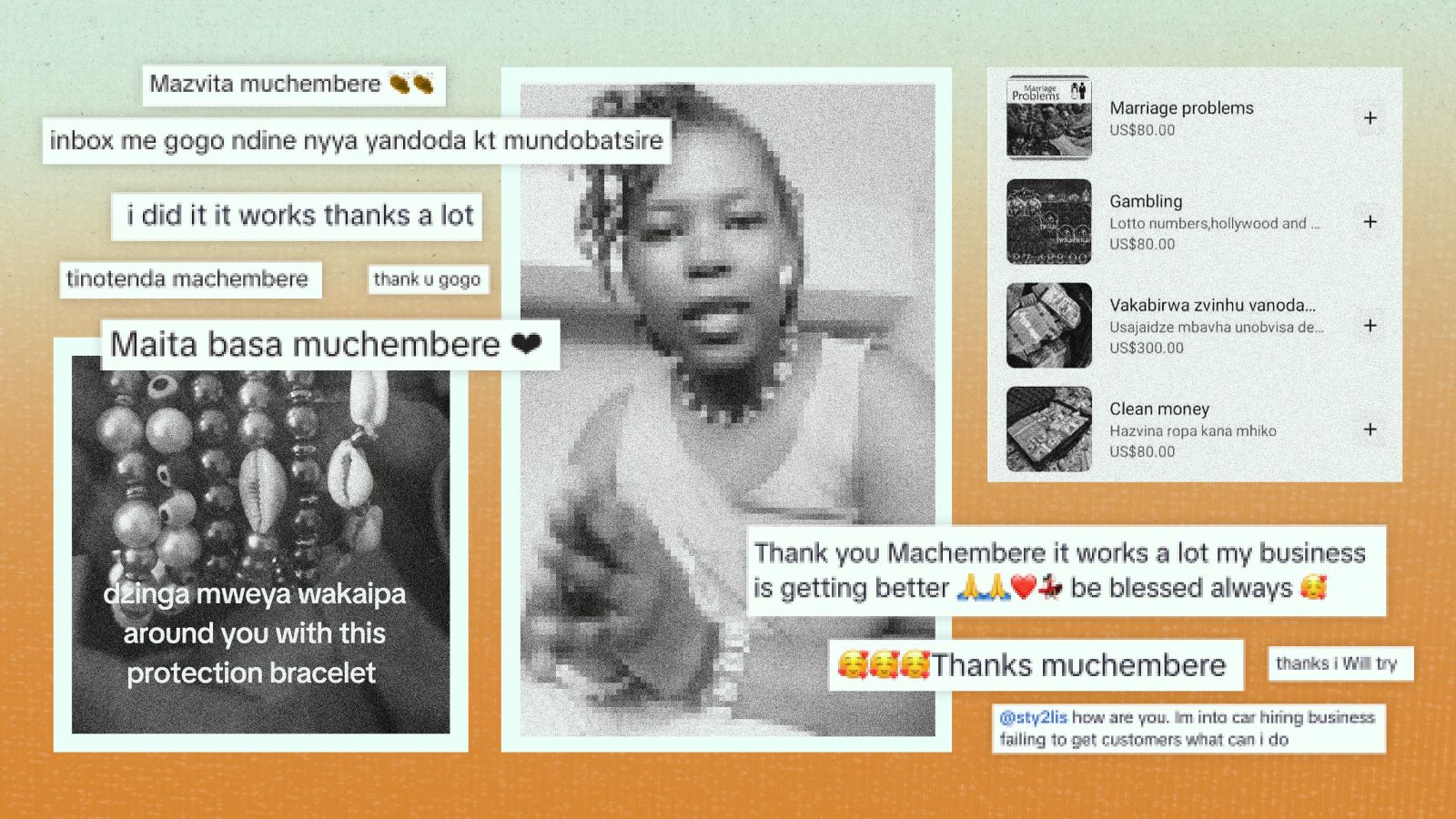Locally known as sangomas, spiritual guides are gaining fame online, but they face criticism from their peers.
- As Zimbabwe’s economy worsens, traditional healers have built a business out of promising people wealth and financial freedom.
- Many have moved their services online, predominantly on TikTok.
- Critics argue that they exploit spirituality for profit, raising ethical concerns.
“Your money problems will be taken care of,” she concluded.
Shumba, 36, was addressing viewers who had joined her TikTok livestream to learn how to get rich. The Zimbabwean traditional healer, or sangoma in the local dialect, has been giving spiritual advice on TikTok for nearly two years, and has around 31,000 followers on the Chinese social media platform.
“Traditional healer from Zimbabwe makes people rich” has become a popular content category on TikTok, and Shumba is one of the many sangomas offering spiritual guidance and special prayers to their followers. While such services have been part of Zimbabwe’s culture for centuries, TikTok has helped traditional healers find a global audience. Some of their most active followers are from other African countries, as well as the U.S. and the U.K. As they advise people on TikTok about how to get rich, the platform has helped the sangomas improve their financial conditions. In their community, however, TikTok sangomas are often looked down upon and face opposition from more orthodox peers.
“We have seen that with Pentecostal church leaders and their use of radio and television. We have seen people flocking to those churches seeking fortune,” Oswelled Ureke, a senior lecturer of television studies and digital media production at the University of Johannesburg, told Rest of World. “There could be a connection between the difficulties that people face in life and their consultations of sangomas. But it might also be that it’s just for entertainment purposes.”
The southern African country has been dealing with an economic crisis marked by hyperinflation, high unemployment, and rising poverty.
Lesley Chihera, a 29-year-old Harare-based hairdresser, started consulting sangomas on TikTok in 2020. She had lost her livelihood due to the pandemic lockdowns, and was unable to visit the prophets she had regularly consulted. Now, she follows a network of TikTok sangomas and is convinced that their counseling will help her overcome financial distress.
“Right now, I really need money and that is why I am on TikTok sessions,” Chihera told Rest of World. “God-willing and your vadzimu [family spirits] permitting, things can change for the better with help of TikTok sangomas.” Following the sangomas’ advice, she has dumped eggs and old currency notes in the middle of the road to ward off evil spirits, among other things.
For the healers, TikTok has been a financial boon. A sangoma charges anywhere between $80 and $300 for a consultation, depending on the service and the location of the client.
Tanya Chisu became a traditional healer in 2018. For the first few years, Chisu, now 21, struggled to find clients and relied almost exclusively on a few referrals. In October 2022, she joined TikTok to “learn more about spiritual things from other, more experienced healers,” she told Rest of World. Over time, Chisu developed a following of her own.
“Now I make more than $1,500 [in a month],” she said. “Sometimes $2,000 per month.” Money and fertility issues are the most popular topics for consultations. The income from TikTok has helped Chisu gain “financial freedom.” She is currently saving up to buy a car.
Sekuru Kanengo, a Harare-based sangoma, has nearly 1,900followers on TikTok. He charges $200 per consultation from local clients, and $300 from international clients, according to an automated message from the WhatsApp number linked to his TikTok page.
Earlier this year, Sekuru Tasvu, a traditional healer who has around 430 followers on TikTok, was in the news for spending $30,000 on his lavish wedding. Tasvu charges between $80 and $300 per consultation, depending on the service, according to information on his WhatsApp profile.
But the Zimbabwe National Traditional Healers Association does not recognize the work of sangomas who offer services through TikTok, spokesperson Prince Mutandi told Rest of World.
“Most of these TikTok and social media sangomas are thieves masquerading as traditional healers,” Mutandi said. “Spirituality and technology do not mix. They are like water and oil.”
Grace Mhofela, a Harare-based entrepreneur who has consulted a sangoma on TikTok in the past, told Rest of World she found her to be “bogus.”
“All they demand after approaching them is money,” Mhofela said. “In my case, I had lost money to thieves … I had no money and one sangoma asked me to pay $200 to consult with her.”
Chisu dismissed the allegations, saying she and many others are “genuine” sangomas who are simply “comfortable using technology.”
“[Social media] gives a platform for the expression of things that would normally occur offline, and because of its affordances, it helps people from different walks of life to access the services of sangomas,” Ureke said. “Whereas, in offline spaces, they would have had to travel long distances to go and consult sangomas face-to-face.”
Author: Chris Muronzi is a business and tech journalist based in Harare, Zimbabwe.







